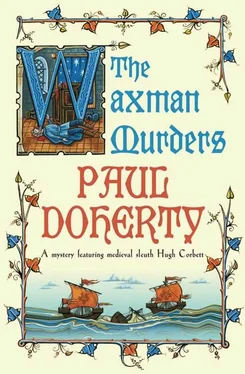Paul Doherty - The Waxman Murders
Здесь есть возможность читать онлайн «Paul Doherty - The Waxman Murders» весь текст электронной книги совершенно бесплатно (целиком полную версию без сокращений). В некоторых случаях можно слушать аудио, скачать через торрент в формате fb2 и присутствует краткое содержание. Год выпуска: 0101, Жанр: Исторический детектив, на английском языке. Описание произведения, (предисловие) а так же отзывы посетителей доступны на портале библиотеки ЛибКат.
- Название:The Waxman Murders
- Автор:
- Жанр:
- Год:0101
- ISBN:нет данных
- Рейтинг книги:3 / 5. Голосов: 1
-
Избранное:Добавить в избранное
- Отзывы:
-
Ваша оценка:
- 60
- 1
- 2
- 3
- 4
- 5
The Waxman Murders: краткое содержание, описание и аннотация
Предлагаем к чтению аннотацию, описание, краткое содержание или предисловие (зависит от того, что написал сам автор книги «The Waxman Murders»). Если вы не нашли необходимую информацию о книге — напишите в комментариях, мы постараемся отыскать её.
The Waxman Murders — читать онлайн бесплатно полную книгу (весь текст) целиком
Ниже представлен текст книги, разбитый по страницам. Система сохранения места последней прочитанной страницы, позволяет с удобством читать онлайн бесплатно книгу «The Waxman Murders», без необходимости каждый раз заново искать на чём Вы остановились. Поставьте закладку, и сможете в любой момент перейти на страницу, на которой закончили чтение.
Интервал:
Закладка:
Lady Adelicia stood accused of murdering her miserly husband, of smashing his skull with a fire-tong, splattering his chancery chamber with blood and brains. Yet how could she have done that? Wendover knew she was innocent. On the very afternoon the heinous crime had been committed, Adelicia had been with him in his chamber at The Chequer of Hope, ripe and rich, turning and twisting under him. She’d arrived as she always did, in disguise. The tavern was so busy, it was easy for her to slip like a shadow up its outside staircase. Yet such secrecy had not saved her from disgrace. Now she had been imprisoned and accused of murder. So far she had said nothing, yet soon the justices, led by that hard-hearted bastard Castledene, would force her to plead either way under peine forte et dure — she would be laid in the cobbled yard of the Guildhall and pressed with wood and weights until she did so.
Wendover was in such an agony of mind, he was hardly aware of his duties or his surroundings. He was oblivious of the biting cold, the stark, empty, white-sheeted enclosure, the soaring curtain wall he was resting against and, in the distance, the brooding manor house of Maubisson. He was truly facing his own sea of troubles. Not only did he have Lady Adelicia’s imprisonment to deal with, and the charges which might be laid against him; there was also the business of the Cloister Map and, of course — Wendover shook himself from his day-dreaming — the safeguarding of Maubisson. He left the shelter of the curtain wall and gazed across the hard-packed snow at the manor house, a huddle of dark buildings ranged along the brow of a hill. He could glimpse slivers of light between the shutters over the narrow windows. As he walked closer, straining his eyes, he could make out the outline of the great hall with its gabled wings either end, as well as its porch and steps lit by flickering cresset torches fixed in sconces on either side of the cavernous main door. A strange place, Maubisson. Given a French name by a God-obsessed merchant who had decided to build a church in the old English style that existed before the Conqueror came. A long nave had been raised, really nothing more than a hall; a tower was supposed to be added, but the merchant went to his eternal reward before his idea ever took shape. There had been no consecration and Maubisson had fallen into the hands of the Crown and the city corporation. Over the years other wings had been attached: two-storey buildings of plaster and wood on a stone base which formed a quadrangle with an arched double gateway at the back; that gate, together with the courtyard within, was closely guarded by Wendover’s men, as was each side of the building as well as the front door.
Wendover stared up at the sky. Night was fading; soon it would be morning. He moved further away. All was still. The owl in the trees had flown on, whilst the dog fox yipping at the cold as it hunted in the undergrowth along the curtain wall had fallen silent. Wendover began to walk the perimeter. He checked the guards as far as he could see, but the snowdrift was rather too deep for the arduous climb up the hill to the porch, so instead he returned to the main gate, sighing with relief at the shelter it provided. He wondered how the foreigners inside were coping. Had they recovered from their journey sickness? Castledene, as well as that interfering city physician Desroches, had been most insistent that Paulents and his family be kept safe and secure. Wendover suspected that the knight was more concerned about protecting the precious possessions of the merchant than anything else.
Wendover walked across to the campfire, crouching down amongst the other city guards to warm his hands and take his share of the strips of meat cooked to almost black on the oil-soaked pans thrust into the flames. He drank some watered wine and waited. At last it came: the bells of the cathedral, St Augustine’s and other city churches tolling the hour for Lauds and the Jesus Mass. He rose to his feet, tightened his belt, pulled his cloak about him and walked towards the main door. He felt tired, and the journey up the slight incline where the snow had drifted deeply seemed to take an age. He shouted at one of the guards on the main steps to come and help him. The man floundered down to meet him holding a lantern.
‘Thanks be to God,’ the guard yelled, extending a staff for Wendover to grip. ‘At least it’s stopped snowing.’
Wendover grunted in reply as he grasped the pole and pulled himself forward, free of the drift. He climbed the steps to where the rest of his guards were grouped around the fire at the top, lifted the heavy brass door weight, carved in the shape of a mailed fist, and brought it down. He could hear the crashing echo through the hall beyond, but it brought no response. .
The dungeons beneath the Guildhall in Canterbury were fetid, rank holes, but Lady Adelicia Decontet had been given the best: this stood at the end of a mildewed passageway, a small, narrow chamber sealed off by a heavy door with a grille at the top. The jailor liked to joke that it was the most luxurious of his lodgings, reserved for prisoners awaiting either trial or their final journey in the hangman’s cart to the gallows outside the city gates. Lady Adelicia now sat in the corner of the cell, warming herself over a dish of coals and staring around in the light of a thick, evil-smelling tallow candle which she’d paid the jailor to fix on an iron hook driven into the wall. She had read and studied all the graffiti etched there: names and initials, sometimes prayers — ‘Jesu Miserere, Maria Mater’ — but in the main curses or lewd and obscene drawings. She was manacled like the rest of the prisoners, though the chains were long enough for her to move to the small table and the scraps of food on a pewter dish, shreds of salted beef, rye bread and hard cheese, which she’d also purchased from the jailor. She stared up at the great cobwebs spanning each corner under the filthy roof, and down at the straw on the floor which, despite her pleas, hadn’t been changed. It was wet, stinking and rotting black. Thankfully the cell walls were thick and kept some of the cold out, while the chafing dish was generously heaped with sparkling charcoal. The smell of burning was a welcome relief from the foul odours which curled everywhere. She tried to close her ears to the cries and shouts of other prisoners, the banging at doors and the cursing of jailors. She’d been supplied with silver and had bribed her keepers well. At least she could eat, was allowed some form of movement, given a jakes pot and, every third day, handed a bowl of water and a rag to wash and clean herself. The pallet bed had also been sheeted and provided with two woollen rugs to wrap herself in when she eventually did decide to sleep.
Any other woman would have been terrified at the prospect facing her, but Lady Adelicia was cold and impassive, her mind teeming like a busy beehive. She knew she was no murderess. True, she’d hated her husband — who wouldn’t? — with his dirty, cunning ways, slobbering mouth, and small hard eyes like two piss-holes in the snow! An old fox, with his pointed face, scrawny red hair and protuberant ears. A man wealthy enough to buy anything he wanted, yet he ate, lived and smelt like the poorest peasant, a miser to the bone, hard of face and hard of heart, with a foul temper and a tongue coated in venom. Adelicia, a royal ward, had been married off to the King’s money-lender; she had never forgotten that, and neither had Sir Rauf.
Adelicia shivered, not so much from the cold but at the thought of her dead husband’s hands on her, forcing her head down, making her perform all sorts of abominable practices. In despair, she had prayed. She had visited the House of the Crutched Friars, sat in their shriving pew and whispered her confession, but what relief could they offer? She’d gone before the lady altar, lit tapers, prayed her Ave beads, but there was no escape or respite until Berengaria had arrived. She was a foundling raised by the parish who had done great service in the household of one of Sir Rauf’s clients. When the man had gone bankrupt, Sir Rauf, true to form, had seized all his goods, and Berengaria, a sly minx of about sixteen summers, with saucy eyes and a cheeky mouth, became part of their household. In a short time she and Adelicia had become allies, though not friends. They understood each other. Adelicia would give Berengaria coins, favour her, and allow her liberties never permitted before, and when she had met Wendover, the girl had come into her own.
Читать дальшеИнтервал:
Закладка:
Похожие книги на «The Waxman Murders»
Представляем Вашему вниманию похожие книги на «The Waxman Murders» списком для выбора. Мы отобрали схожую по названию и смыслу литературу в надежде предоставить читателям больше вариантов отыскать новые, интересные, ещё непрочитанные произведения.
Обсуждение, отзывы о книге «The Waxman Murders» и просто собственные мнения читателей. Оставьте ваши комментарии, напишите, что Вы думаете о произведении, его смысле или главных героях. Укажите что конкретно понравилось, а что нет, и почему Вы так считаете.












